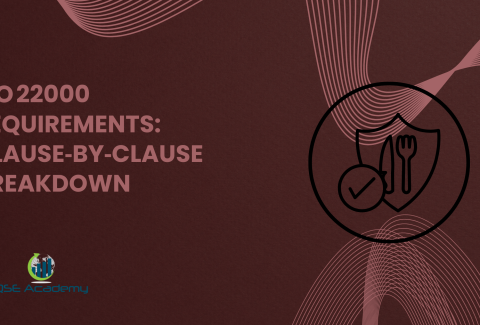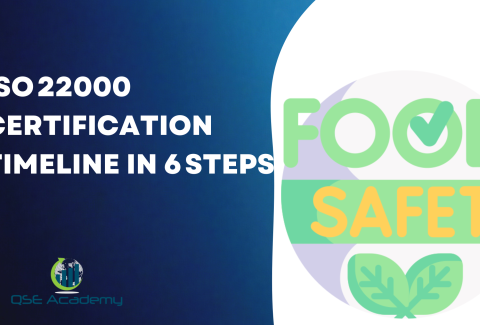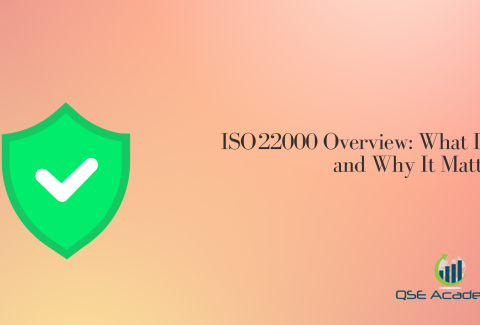IFS V8 Overview: What It Is and Why It Matters
Last Updated on December 23, 2025 by Hafsa J.
Setting the Foundation
Many food manufacturing companies reach a point where customer expectations, regulatory requirements, or market expansion plans push them to explore certification options. IFS Food V8 is one of the most recognized and commercially relevant standards in global food supply chains—especially for businesses supplying European retailers or private-label brands.
If you’re evaluating IFS for the first time, the volume of terminology, requirements, and audit structure can feel overwhelming. The purpose of this guide is simple: to give you a clear, plain-English understanding of what IFS V8 is, why it exists, and why it matters for food manufacturers today.
By the end of this article, you’ll understand:
- The purpose and function of IFS Food V8
- Who the standard applies to
- The value it brings to food-manufacturing companies
- How it works in practice
- Whether it aligns with your long-term business direction
This article serves as the foundation before exploring deeper requirements, implementation steps, audit mechanics, or tools.
What Is IFS Food V8? — A Clear, Simple Explanation
IFS Food V8 is an internationally recognized food-safety and quality standard designed for companies that process, manufacture, or handle food products. It’s part of the Global Food Safety Initiative (GFSI) framework, which means retailers, distributors, and brand owners trust it as a benchmark for food-safety performance and supplier reliability.
While regulations define the legal minimum, IFS V8 sets a higher benchmark. It focuses on consistent execution, documented proof, and operational behaviors that ensure safe, compliant, and quality-controlled food production.
In simple terms:
IFS shows buyers you don’t just have rules—you follow them.
 Who Is IFS Food V8 Designed For?
Who Is IFS Food V8 Designed For?
IFS is specifically intended for food manufacturers, private-label producers, co-packers, and companies preparing products for retail shelves or distribution networks.
Typical users include:
- Ready-to-eat food facilities
- Dairy and beverage manufacturers
- Meat, poultry, and seafood processors
- Bakery and confectionery production sites
- Frozen, canned, and packaged food producers
- Baby food and high-risk product manufacturers
One manufacturer I supported—small team, regional presence—only explored certification once a European supermarket chain reached out. Their growth opportunity depended entirely on meeting IFS requirements. That single buyer request shifted their strategy.
IFS isn’t based on company size—it’s aligned with business model and customer expectations.
Why IFS Matters — The Business Case Behind the Standard
IFS certification isn’t just about compliance. It supports commercial growth, operational maturity, and long-term competitiveness.
Key benefits include:
- Access to high-value buyers and retail chains
- Stronger negotiation positioning in tenders and supplier onboarding
- Improved consistency in food safety and product quality
- Better traceability, accountability, and operational control
- Increased confidence from customers and stakeholders
When a facility operates according to IFS standards, risk decreases, internal clarity increases, and day-to-day execution becomes more predictable.
Predictability is one of the biggest strategic advantages in food manufacturing.
How IFS Food V8 Works — Structure and Scoring at a Glance
IFS V8 is structured around a set of defined requirements grouped into clear sections. These include expectations on:
- Food-safety and quality-management systems
- Resource competence and training
- Production and process control
- Supplier management and raw-material oversight
- Food safety culture and measurable improvement
Audits follow a scoring model based on conformity:
- A, B, C, or D grades depending on compliance level
- Major and minor non-conformities
- KO (Knock-Out) requirements, which are critical and must be fully met
Unlike some standards that focus heavily on documentation, IFS emphasizes both documented proof and real operational execution. In practice, this means written procedures must match what actually happens on the production floor.
Core Requirements in IFS V8 — What the Standard Expects
IFS V8 expects organizations to demonstrate control, consistency, and risk awareness across the full product life cycle. Key pillars include:
- Documented systems that align with operations
- HACCP-based risk assessment and preventive controls
- Traceability and recall capability
- Robust supplier evaluation and monitoring
- Verified sanitation, allergen, and contamination controls
- Employee competence and awareness
- Leadership engagement in food-safety culture
A common mistake is assuming certification is primarily a paperwork exercise. In reality, success comes from aligning documentation, behavior, and on-floor execution.
Culture and Continuous Improvement — A Key Shift in V8
IFS V8 reinforces the importance of food-safety culture and continuous improvement. This means every level of the organization—from leadership to operators—must demonstrate awareness, responsibility, and proactive behavior.
Culture isn’t built through one-time training. It becomes visible through:
- Consistent decisions
- Transparent reporting
- Engagement and accountability
- Habitual adherence to safe practices
Certification reflects not only compliance but maturity.
The Certification Process — A Simplified View
The journey to IFS certification typically follows five stages:
- Initial gap assessment and readiness check
- System development or alignment with IFS requirements
- Training and internal audit activities
- Corrective actions and operational fine-tuning
- Certification audit and ongoing maintenance cycle
Timelines vary depending on current system maturity, operational readiness, and organizational structure.
IFS isn’t a one-time milestone—it’s an ongoing cycle.
Do You Need IFS V8? — A Simple Decision Filter
IFS is likely relevant if:
- Your customers require it
- You plan to supply European or private-label markets
- You manufacture retail-ready food products
- You want recognized third-party validation of safety and consistency
If none of those apply today, but future expansion is part of your strategy, exploring IFS now may help build alignment early.
FAQs — Common Questions Answered Briefly
Is IFS legally required?
No. It’s a commercial requirement driven by buyers.
Does certification improve product quality?
Indirectly, yes. It improves processes, controls, and discipline.
Is it difficult to achieve?
It’s achievable with preparation and consistent implementation.
Conclusion — Why IFS V8 Matters Today
IFS Food V8 strengthens confidence, demonstrates reliability, and positions a manufacturer as a trusted supply-chain partner. It’s more than a certificate—it’s a framework for safer operations, consistent performance, and competitive advantage in demanding markets.
If you’re exploring readiness, planning certification, or evaluating timing, the next step is understanding where you currently stand and which gaps may need attention.
Whether it’s ISO 9001, ISO 22000, or the cosmetics-focused ISO 22716, I’ve spent my career I’m not here to call myself an expert—I prefer “enthusiast” because I truly love what I do. When I’m not writing about standards, you’ll probably find me playing Piano 🎹, connecting with people, or diving into my next big project💫. I’m an engineer specialized in the food and agricultural industry
make ISO standards less intimidating and more approachable for everyone.
turning complex jargon into clear, actionable steps that businesses can actually use.
There’s something incredibly rewarding about helping people navigate food safety and quality management systems
in a way that feels simple, practical, and even enjoyable.
I have a Master’s in QHSE management and over 12 years of experience as a Quality Manager
I’ve helped more than 15 companies implement ISO 9001, ISO 22000, ISO 22716, GMP, and other standards
My clients include food producers, cosmetics manufacturers, laboratories, and service companies
I believe quality systems should be simple, useful, and efficient.










